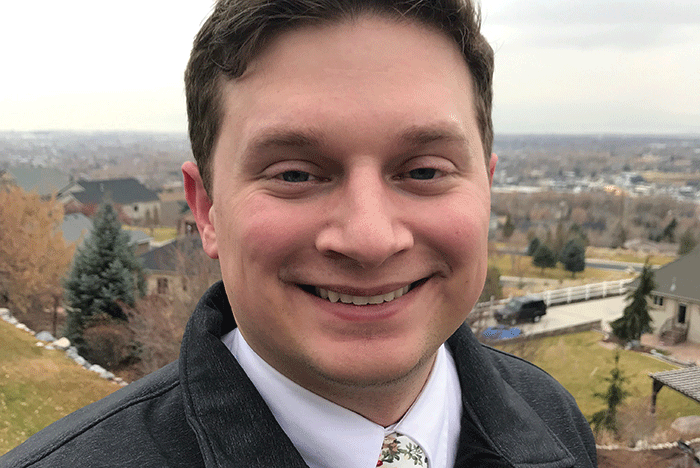The Journey to CHFM

ASHE Senior Advocacy Associate Benjamin Leutze, CHFM, CHC.
Image courtesy of Benjamin Leutze
Benjamin Leutze, CHFM, CHC, senior advocacy associate for the American Society of Health Care Engineering (ASHE), joined the organization in 2019 after working as a third-party commissioning agent technician for five years.
As part of his ASHE role, Benjamin serves on several national committees and sub-committees that develop regulations for the design and construction of health care facilities. He also has continued to acquire greater knowledge and expertise about the field and set a personal professional goal to pursue two ASHE certifications: Certified Healthcare Facility Manager (CHFM) and Certified Healthcare Constructor (CHC), which he earned in January and February, respectively.
He recently spoke with Health Facilities Management about his experience in preparing for the CHFM exam, sharing what he learned in the process and offering advice for others pursuing CHFM credential.
Benjamin, first congratulations on hitting your goal and passing your CHFM exam. Can you tell me why you wanted to earn this credential?
I’ve always planned on it even before working within ASHE. That was the initial reason and the biggest reason. I’ve always been of the opinion and was always raised with the mindset to pursue education continuously throughout your life. And now that I’m with ASHE, I also felt it was important to hold that credential specifically because of the work I do.
As senior advocacy associate, I interact with so many ASHE members and codes and standards committees. This credential not only provides me with credibility when I’m talking on committees or presenting to them, but it also gives me credibility amongst my peers to communicate to them that I’m coming from a place of knowledge and that I do understand what they’re going through. It lets them know that we can have those real life conversations.
Earning the CHFM credential really is a great accomplishment for professionals looking to pursue it, but I’m sure that people will wonder if your position within ASHE gave you a leg up. Do you feel that being on ASHE staff gave you an edge on this exam?
Yes and no. Even though I’m an ASHE staff member, there is a separate entity that handles the exam testing, and ASHE did not provide me with a cheat sheet. So, I did not receive the questions beforehand, and I did not know the answers on the test ahead of time.
But if we take a step back and look at my role within ASHE, what I do on a daily basis is read code. For instance, one of the assignments I’m working on now is an update of the Centers for Medicaid & Medicare Services (CMS) K-tag crosswalk on our website, which is a resource we have that takes CMS requirements and aligns it to show what specific codes are referenced in those K-tags and the accrediting organization standards, as well. Because of my role, I’ve gotten very familiar with the codes and requirements of health care facilities, and I think that helped me out, amongst other things.
However, that on-the-job training is not a supplement for the studying you have to do. No matter how long you’ve been in the industry, you can’t just go take the exam. It’s not a walk-in, take it, and pass it exam. It’s also not for people new to the field. It’s recommended to have a few years of experience in facilities management. And even then, you need to study for this.
How did you prepare for the exam, and where did you focus your studies?
The exam covers five content areas, and in June of 2020 I decided that I needed to just bite the bullet. I’m not the best test-taker in the world and I will never profess to be, so I knew I needed to just crack down and start studying.
I used two ASHE resources related to CHFM, the CHFM Exam Review Program and the CHFM Flash Cards. I used those as kind of a baseline to learn what I should know and expect for this exam. I also used those resources to supplement things that I’ve learned either in school at Brigham Young University getting my bachelor’s degree or in what I do currently with ASHE.
I used a similar practice from college. Every night during the workweek I’d spend at least an hour reading material and reviewing things. An example being I’m not the best with fire systems, things like fire alarms and fire suppression systems. So, I dedicated a lot of research into NFPA requirements and all the codes and standards, and inspection requirements behind all of that because I knew that’s where one of my biggest gaps was. I focused a lot of my time finding those references and making sure I knew what the testing and inspection intervals are within that arena.
Another knowledge gap for me was administration because I never directly worked for a hospital facilities engineering department. I came to ASHE after working as a consultant, so I saw what happened from the outside with planning, design and construction, but I never really got to see a lot of the internal operations. But ASHE does a great job of bridging that with our monographs.
Looking back on your preparation, do you feel you were focused on the right areas?
I think I blew the compliance piece a little bit out of proportion during my studying. I expected probably about 60% of the exam to be about compliance and it really wasn’t. The exam is actually split very well between the five categories.
The CHFM exam covers so much material, but will pinpoint very specific items within that material. So, you have to understand the health care facility management environment as a whole, but also be able to drill down to very specific references and examples and be able to use real-word applications.
Was there anything about the exam that surprised you?
The exam is not perfect. One thing that I had to realize in taking the exam is purposefully ambiguous, and I’m sure much of the ambiguity in questions is because they have to be. You can’t give the answer away, but again in this industry you’re taught to be so accurate with your language when so much is dependent on written code language. And so, I think that for me was my biggest hurdle in getting tripped up and stuck on the particulars of a question.
You’ve passed the exam and say you’re happy with the results, but looking back is there anything you wished you would’ve done differently during the process?
I think it would have been helpful for me to approach some people with the credential and ask “Hey, without giving answers away, are there specific resources listed in the CHFM handbook that I should be studying?” If I had done that with CHFM, I think I would’ve done even better.
The exam kind of does an hourglass look. Facilities management as a whole is a broad term, and the exam gets you to look very narrowly at a small 110-question scope of the field. Going into the exam, it’s helpful to understand why they ask the questions they do. You need to understand that if you can’t calculate what goes into a capital budget versus what goes into an operations budget, you’re not going to understand how to apply that several million-dollar budget into caring for patients. That will help tweak your mindset even though the exam doesn’t necessarily pose the question in that way. But if you go into this with only a facilities management perspective, you’re going to miss the point and won’t see the whole picture of the exam.
What is some advice you’d like to give to others studying for the exam?
Use what ASHE provides as education. I think of anyone on the market right now, ASHE still provides the best overall resources there are for these exams.
Another piece of advice I can give is to remember that this exam covers things from a national level. Coming in and applying a local jurisdiction’s requirement is not going to work. You have to take a step back from that local mindset. What your authority having jurisdiction requires or allows is not necessarily the right answer on the exam. And quite often you’ll find on a question that there is an answer that makes sense in your jurisdiction but is inaccurate compared to the national standards.
One last thing to remember is this is not an open-book exam, and that’s a good representation of health care facilities management. I talk with members on a regular basis and from what they say about working in health care facilities management, you don’t always get to open up a book and search through 800 pages really quickly when someone asks a question. You have to be able to give an almost instantaneous answer in this field, so it’s important to know your stuff. Especially now during a pandemic. Our members say you have to be quick on your feet and be able to innovate and drive change. The exam sends that trigger that you have to know some of this stuff right then and there if someone asks you.
How do you plan to use these certifications to further your career?
Eventually I do want to go and work directly for a hospital. I want to go and take care of hospitals and work within health systems. Having CHFM behind my last name will be one key piece to being able to do that and setting myself apart to show that I know what I’m talking about, I know what I’m doing and I’m the right candidate for some of these positions. So hopefully in the future you’ll see me working directly for a hospital or health system.




